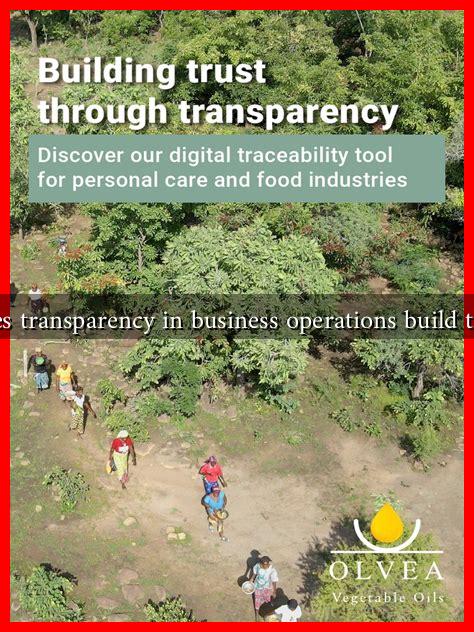-
Table of Contents
Does Transparency in Business Operations Build Trust?
In today’s fast-paced and interconnected world, businesses are increasingly recognizing the importance of transparency in their operations. Transparency refers to the openness and clarity with which a company communicates its practices, policies, and performance to stakeholders, including customers, employees, and investors. This article explores the relationship between transparency and trust in business operations, examining how transparency can foster trust and the implications for companies that prioritize it.
The Importance of Trust in Business
Trust is a fundamental component of successful business relationships. It influences customer loyalty, employee engagement, and investor confidence. When stakeholders trust a company, they are more likely to:
- Make repeat purchases
- Recommend the business to others
- Remain loyal during challenging times
- Invest in the company
According to a 2021 survey by Edelman, 81% of consumers said that they need to be able to trust a brand to buy from them. This statistic underscores the critical role that trust plays in consumer behavior and business success.
How Transparency Builds Trust
Transparency in business operations can significantly enhance trust in several ways:
- Open Communication: Transparent companies communicate openly about their practices, policies, and performance metrics. This openness helps to demystify operations and fosters a sense of inclusion among stakeholders.
- Accountability: When businesses are transparent, they are more accountable for their actions. This accountability can lead to improved performance and ethical behavior, as stakeholders are more likely to hold the company responsible for its commitments.
- Enhanced Reputation: Companies that prioritize transparency often enjoy a better reputation. A positive reputation can attract customers and investors, as people are more inclined to engage with businesses they perceive as honest and ethical.
- Informed Decision-Making: Transparency provides stakeholders with the information they need to make informed decisions. This empowerment can lead to stronger relationships and increased loyalty.
Case Studies: Companies That Exemplify Transparency
Several companies have successfully implemented transparency in their operations, leading to increased trust and loyalty among stakeholders:
- Patagonia: This outdoor clothing brand is known for its commitment to environmental sustainability and ethical practices. Patagonia openly shares information about its supply chain, labor practices, and environmental impact, which has built a loyal customer base that trusts the brand.
- Buffer: A social media management platform, Buffer is renowned for its transparency regarding employee salaries and company performance. By sharing this information publicly, Buffer has fostered a culture of trust and openness, both internally and externally.
- Starbucks: The coffee giant has made significant strides in transparency by providing information about its sourcing practices and sustainability initiatives. Starbucks’ commitment to ethical sourcing has resonated with consumers, enhancing their trust in the brand.
Challenges to Achieving Transparency
While transparency can build trust, it is not without its challenges. Some of the common obstacles businesses face include:
- Fear of Repercussions: Companies may hesitate to disclose negative information due to fear of backlash from stakeholders.
- Complexity of Information: The intricacies of business operations can make it difficult to present information in a clear and understandable manner.
- Competitive Concerns: Businesses may worry that sharing too much information could give competitors an advantage.
Conclusion: The Path to Trust Through Transparency
In conclusion, transparency in business operations is a powerful tool for building trust among stakeholders. By fostering open communication, accountability, and informed decision-making, companies can enhance their reputation and cultivate loyalty. While challenges exist, the benefits of transparency far outweigh the risks. As consumers increasingly demand ethical and transparent practices, businesses that embrace transparency will likely find themselves at a competitive advantage.
For more insights on the importance of transparency in business, you can explore resources from Edelman’s Trust Barometer.

